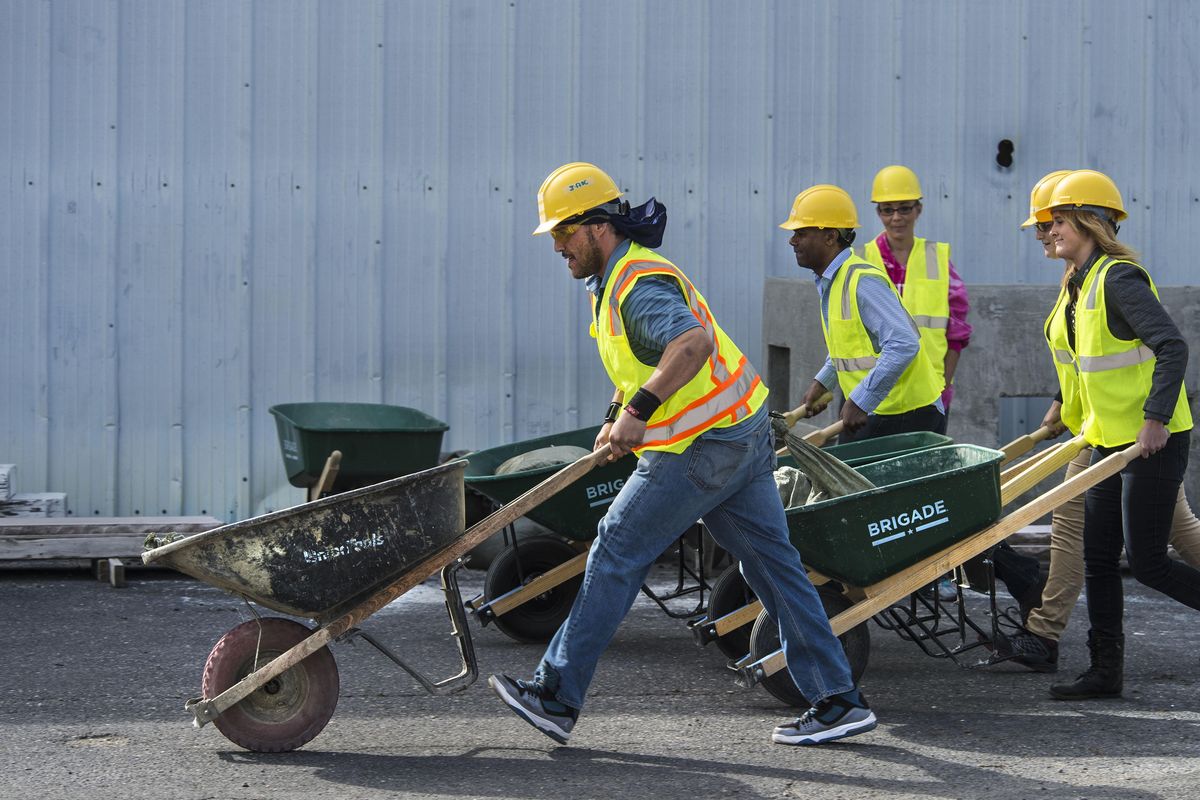Spokane Community College’s apprenticeship program is booming as more people turn to the trades for a solid career

David Cook is honest: “Most of my life I’ve been somebody who has taken from the community and never really added.”
Now, he’s ready for change. He is one of 25 people enrolled in Spokane Community College’s pre-apprenticeship program this fall. He calls it a place that’s “going to help an ex-felon be more productive.”
Cook is a former heroin addict who has bounced in and out of jail and struggled to keep a job. The 41-year-old has been clean for three years and hopes to become a carpenter.
“This is a big move for me and my family,” he said. “It’s really uncomfortable to get up and be on a schedule.”
SCC has absorbed a 25 percent increase in enrollment in their apprenticeship programs in 2015, and is expected to grow again this year, said program manager Kenna May. The apprenticeships allow students to go to school while working in a trade, such as carpentry. The program varies in length from one to six years and is the equivalent of earning a bachelor’s degree, May said. Students earn money as they go to school. For trades like construction, students attend class during the winter months.
“If the economy is down, apprenticeship is down,” she said, and “if it’s up, apprenticeship is up.”
SCC’s apprenticeship enrollment numbers have drastically increased over the past several years as the regional economy rebounds, said Todd Turner with Inland Empire Electrical. Additionally, Turner said an older generation of laborers is starting to retire, creating demand across the industry.
Inland Empire Electrical has 90 apprentices this year, which is about 15 more than last year, he said. Between 2014 and 2015 the SCC program – which reaches statewide – added 545 students. Although the final enrollment numbers for this year are not in yet, May predicts the program will continue to grow.
Students can become apprentices in a number of different industries, such as plumbing, carpentry and electrical. SCC works with 23 different programs, both union and nonunion.
“You know, not everybody wants to go to a four-year college and be a doctor or a lawyer or whatever,” May said. “People can be very successful in apprenticeships.”
In response to the increase, SCC has implemented a pre-apprenticeship program, which allows students to learn the basics of manual labor, before committing to a program. The program is one quarter and costs $25. It started last year. Over the course of three quarters, 52 students started the program and 38 graduated.
“My goal is to get people out of poverty in this generation we are working in, not the next,” said Erin Meuer, the instructor of the pre-apprenticeship program.
According to Meuer between 30 and 35 percent of the current workforce will retire by 2030. She blames that impending worker shortage partly on normal cycles of employment and retirement, and partly on the “four-year-or-failure model,” which tells students they haven’t succeeded if they don’t graduate from a four-year university. In 2013, Spokane Public Schools implemented a T-2-4 model to address this very issue – encouraging students to go to technical schools, two-year colleges or four-year universities.
A big part of Meuer’s job is helping students learn the skills necessary to integrate into the laborer culture. To do this, they focus on practical skills and acting out likely work situations. A stated goal of the program is to help women and minorities enter the trades.
Sheila Obrien is a 59-year-old music teacher who divorced in March. Now she’s hoping to get into SCC’s aerospace apprenticeship program.
“A lot of satisfaction comes out of framing,” she said. “I really like framing instead of the finish work.”
When Obrien is not attending classes she’s building a greenhouse at her home.
For Obrien and Stephanie Skupien, the program made them feel more comfortable integrating into an industry traditionally dominated by men.
“It’s typically a white-male-dominated construction trade,” Turner said. “They are building their confidence … so when they go in to the program this gives them a step up.”
Students in the pre-apprenticeship program learn basic skills – how to lift a wheelbarrow or use hammers and power tools. They also take classes like construction math and professional development and job skills, Meuer said.
Meuer’s expertise is getting immigrants and refugees into the workplace. In many ways, she said the work she’s doing with the pre-apprenticeship program is similar.
“They definitely are marginalized, and they are not used to getting consistent help,” she said.